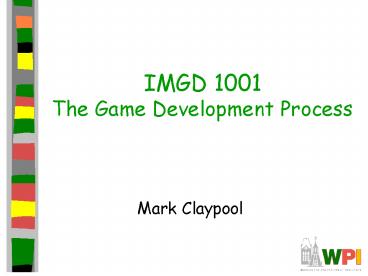IMGD 1001 The Game Development Process PowerPoint PPT Presentation
Title: IMGD 1001 The Game Development Process
1
IMGD 1001The Game Development Process
- Mark Claypool
2
Topics
- Background
- Topics
- Course Materials
- Motivation
3
Professor Background (Who am I?)
- Dr. Mark Claypool (professor, Mark)
- Computer Science
- CS3103 Operating Systems
- CS4513 Distributed Computer Systems
- IMGD1001 (3rd offering)
- Research interests
- Networks, Multimedia, Network games, Performance
4
Student Background (Who Are You?)
- Year (freshman, sophomore, )
- Major (IMGD (Art or Tech), CS, HUA, )
- Programming Classes
- Gamer (casual) 1 to 5 (hard-core)
- Number of Games Built (zero is ok)
- Other
5
What Do You Think Goes Into Developing Games?
- Choose a game youre familiar with
- Assume you are inspired (or forced or paid) to
re-engineer the game - Take 3-4 minutes to write a list of the tasks
required - Chronological or hierarchical, as you wish
- Include your name of game and your name
- (Ill collect and read, but not grade)
- Trade write-ups with another student
- What do we have?
6
Syllabus Stuff
- http//www.cs.wpi.edu/claypool/courses/1001-E06/
- Office hours
- By Appointment
- claypool at cs.wpi.edu
- id111x-ta at cs.wpi.edu
- id111x-all at cs.wpi.edu
7
Course Materials
- Slides
- On the Web
- PPT and PDF
- Caution! Dont rely upon the slides alone! Use
them as supplementary material - (come to class)
- Timeline
- Tentative planning
- Resources
- Game creation toolkits, documentation, etc.
8
Text Books
- Select chapters from text books
- Pickup from Campus Bookstore
- See Web page for full list
- Reading list provided on Web page
9
Course Structure
- Prerequisites
- None!
- Neither Programming nor Art
- In-Class
- Lecture
- Discussion
- Exams
- Out-of-Class
- Reading
- Projects
- Grading
- Exams (45)
- Projects (45)
- Other (10)
(More on Exams and Projects, next)
10
Exams
- 2 exams
- 45 of grade
- Non-cumulative
- Closed-note
- Closed-paper
- Closed-friend
- One-page crib-sheet (handwritten)
11
Projects (1 of 2)
- About 5 projects
- 45 of your grade
- Individual or Group of 2 (scale 1.5 for group)
- Apply concepts taught in class
- Related to Game Development
- Build upon each other
- Should have working game at end!
12
Projects (2 of 2)
- Project 1 Game Inception and Design
- Inspiration of a game, design and documentation
- Project 2 Content Creation
- Create 2-d animated sprites (or other art) and
select supporting content - Project 3 Game Logic
- Implement game objects and game rules
- Project 4 Level Design
- Put above components together in compelling game
- Project 5 Game Evaluation and Testing
- Critique each others games
- Project pitch
- To panel of experts
13
Topics
- Game Design
- The Creative Process
- Design Documentation
- Artistic Content Creation
- Color and Displays
- 2D and 3D
- Graphics
- Animation
- Audio
- Music
- Sound Effects
- Engineering
- Game Architectures
- Programming
- Team Management
- Misc
- Release
- Postmortem
14
Why This Class?
- IMGD requirements (Core Course, see
www.wpi.edu/IMGD) - Introduction to steps of Game Development
- In depth in Area
- Fun! (passion for games)

